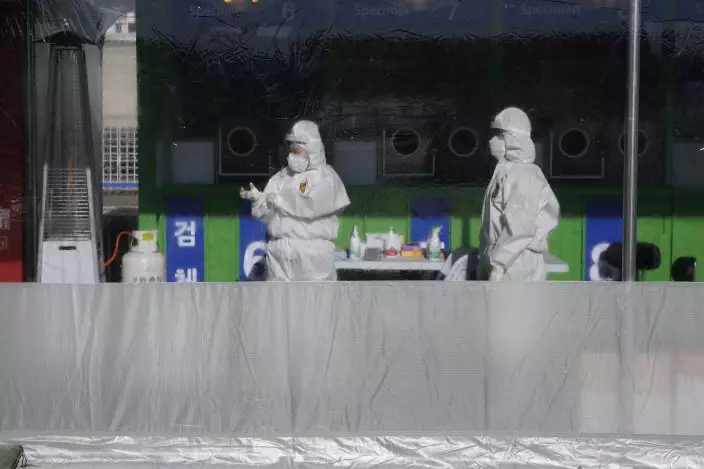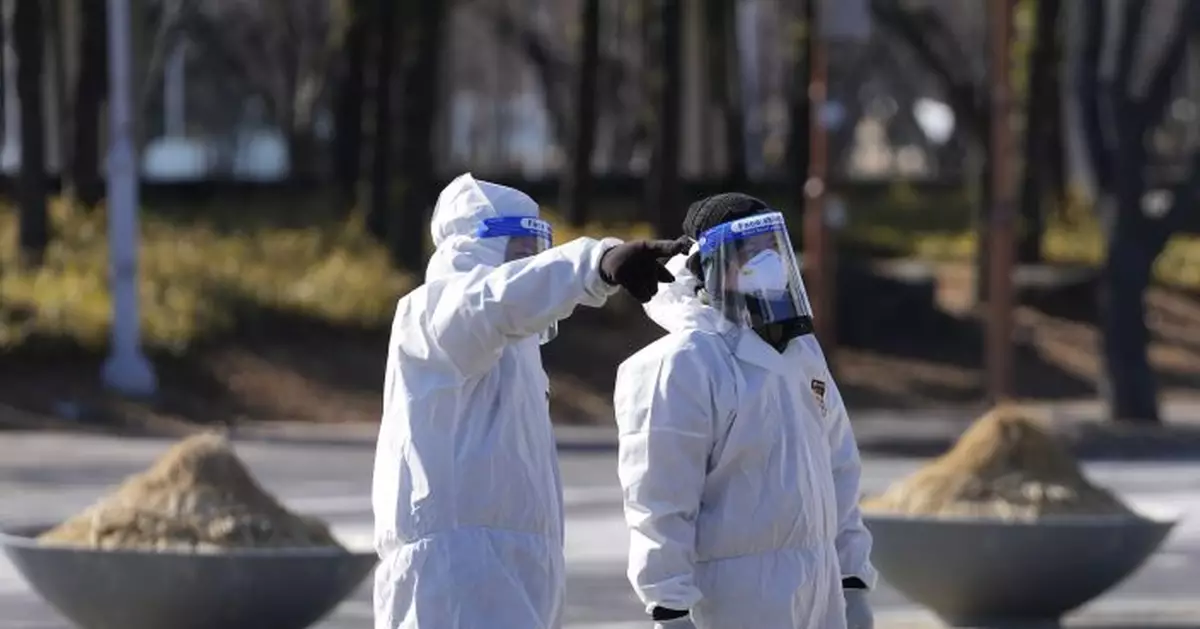JERUSALEM — Israel has begun delivering a fourth vaccine dose for people most vulnerable to coronavirus, becoming one of the first countries to do so as it prepares for a wave of infections driven by the omicron variant.
Israel, which led a world beating vaccination program in 2020, will administer a fourth dose of the vaccine to individuals with weakened immune systems along with elderly residents and employees in care homes.
The rollout of the fourth dose began at Israel’s Sheba Medical Center Friday morning and was administered to heart and lung transplant patients.

Medical workers wearing protective gear prepare to collect samples at a temporary screening clinic for the coronavirus in Seoul, South Korea, Friday, Dec. 31, 2021. (AP PhotoLee Jin-man)
The country is currently experiencing a new wave of infections fueled by the transmissible omicron variant. There were 4,085 new cases recorded on Thursday, the highest daily count of infections Israel has seen since late September.
In response, Israel introduced new restrictions late Thursday in a bid to curb rising infection rates ahead of new year’s eve celebrations. These include a Green Pass, given to fully vaccinated individuals or those who have recently recovered from coronavirus, for outdoor events of more than 100 people and mandatory mask-wearing in outdoor events of more than 50 people.
Israel, a country of 9.3 million people, has reported 8,243 deaths from the coronavirus since the start of the pandemic. Most of its population — more than 6.5 million people — has received at least one dose of the Pfizer/BioNTech vaccine, and more than 4.2 million Israelis have received two doses and a booster.
HERE’S WHAT YOU NEED TO KNOW TODAY ABOUT THE CORONAVIRUS PANDEMIC:
— US children hospitalized with COVID in record numbers
— U.S. health officials press nursing home workers to get booster shots
— New COVID-19 cases in US soar to highest levels on record
— Do at-home COVID-19 tests detect the omicron variant?
— Canadian provinces adopt restrictions amid daily case records
Follow AP’s pandemic coverage at https://apnews.com/hub/coronavirus-pandemic
HERE’S WHAT ELSE IS HAPPENING TODAY:
The government said Friday the current restrictions such as a four-person limit on private gatherings and a 9 p.m. curfew on restaurants and cafes will continue until Jan. 16.
Health Minister Kwon Deok-cheol says South Korea’s daily caseload has recently dropped to the 5,000s from the previous 8,000s thanks to the current distancing guidelines enforced two weeks ago.
But he says the number of critically or seriously ill patients remains above 1,000. Kwon says the omicron variant also continues to spread throughout South Korea and that it’s difficult to prevent it from becoming the dominant strain in South Korea.
On Friday, South Korea added 4,875 new COVID-19 cases, pushing the national tally to 630,838. Health authorities said they’ve also confirmed 269 new cases of the omicron variant, taking the country’s total to 894.
NEW YORK — A coronavirus surge has upended plans to hold a major nuclear treaty conference at the United Nations next month, with participants agreeing Thursday to postpone the meeting days before its scheduled start.
After nearly two years of pandemic delays, delegations from around the world were due to converge Tuesday on U.N. headquarters to take stock of the 1970 Non-Proliferation Treaty, a pillar of nuclear arms control.
But organizers are now penciling in an Aug. 1 start date, according to an email Thursday from the U.N. disarmament office to entities involved. The conference was initially scheduled for spring 2020.
As coronavirus cases spike again in the U.N.’s host city of New York and a growing number of staffers are sick or or quarantined, the world body told the conference leader Monday that it couldn’t accommodate a big gathering now.
The NPT is the world’s most widely ratified nuclear arms control agreement, with 191 participating countries. Nations without atomic weapons committed not to acquire them and to allow verification that nuclear energy programs weren’t morphing into weaponry. Countries that had nukes when the treaty was signed — the United States, Russia, Britain, France and China -- agreed to move toward eliminating them.
TORONTO — Quebec is reimposing a nighttime curfew beginning New Year’s Eve, and Ontario has delayed the resumption of school by two days as several Canadian provinces report new highs for COVID-19 infections.
Quebec Premier Francois Legault says the curfew will be in effect 10 p.m. to 5 a.m. as of Friday night and will run for an indefinite period.
Quebec imposed a pandemic-related nightly curfew last Jan. 9 and did not lift the measure until May 28. It has been the only Canadian province to order a curfew over the coronavirus.
In Ontario, classes had been scheduled to resume Monday but that has been pushed back to Wednesday. Officials say that will give schools time to provide N95 masks to staff and deploy more HEPA filter units.
HONOLULU — Hawaii set an all-time record for new coronavirus cases on Thursday as the state of about 1.5 million people reported nearly 3,500 new infections.
The daily total of new cases reported by health officials was 3,484, topping the record of 2,205 cases set the day after Christmas. The state was averaging just over 100 new cases a day at the beginning of the month.
The latest surge came about two weeks after the first omicron variant case was confirmed in Hawaii.
Honolulu Mayor Rick Blangiardi said there would be no new restrictions on Oahu over the New Year holiday. He said people should take personal responsibility to curb the disease.
SANTA FE, N.M. — New Mexico is running short of free at-home rapid tests to detect COVID-19 infections as the state struggles with the spread of the omicron variant of the coronavirus.
The company that runs the state’s program said Thursday that the state’s supply of tests was overstretched. The announcement came hours after Democratic Gov. Michelle Lujan Grisham wrote that residents could “order a testing kit today.”
By afternoon “all available tests have been shipped” and Vault Health was offering paid testing instead. The state reported an additional 2,209 cases of COVID-19 on Thursday and 26 additional deaths.
NEW ORLEANS -- Louisiana is setting records for new COVID-19 diagnoses, and the state’s omicron variant surge is just beginning, Gov. John Bel Edwards said Thursday.
Thursday’s 24-hour total of 12,467 new cases was more than a third above Wednesday’s 9,378, Edwards said during a news conference livestreamed on Zoom.
He said the U.S. Centers for Disease Control and Prevention said Wednesday’s figure was itself a state record, topping 7,548 set in August, during the delta variant surge.
Edwards says the number of people hospitalized with the virus has risen 268% since Dec. 17, to 762.
The governor said he would not mandate masks unless such an order is needed to keep hospitals from being overwhelmed. But he said people should heed masking recommendations from both the CDC and the state Department of Health.
Wearing a mask is a minor inconvenience “compared to being in a hospital struggling to get oxygen or watching a loved one struggling to get oxygen,” he said.
He and other state and hospital officials around south and central Louisiana repeatedly urged everyone to take precautions such as getting vaccinations and booster shots.
JACKSON, MISS. — Mississippi’s Supreme Court chief justice issued an emergency order Thursday allowing judges to postpone jury trials through mid-January because of the recent surge in COVID-19 cases.
Mississippi Supreme Court Chief Justice Mike Randolph’s order also allows courts to use teleconferencing, videoconferencing and electronic filing to limit in-person contact in courts. Felony plea, felony sentencing and probation violation hearings can be conducted remotely.
The order is an extension of safety regulations that were already in place. Emergency Administrative Order 25 is the fourth emergency order issued by the chief justice since August which allows judges to postpone jury trials.
In his most recent order, Randolph cited the recent uptick in cases — especially the highly contagious omicron variant.
As of Dec. 14, there were 575 new COVID-19 confirmed infections in Mississippi. Approximately two weeks later, the number of confirmed cases increased more than eightfold, to 4,885 cases, Randolph said.
SACRAMENTO, Calif. — With a new and more infectious coronavirus variant sweeping California, attorneys representing inmates say violations of health orders by prison staff risk a repeat of the outbreaks that killed dozens in the first year of the pandemic.
The most recent statistics show large percentages of employees who are required to be tested twice weekly aren’t doing so, and most face no consequences.
Corrections officials say they are updating those figures but have not yet provided new data.
Officials are temporarily shutting down admissions to Wasco State Prison in the San Joaquin Valley where there have been more than 150 new infections in the past two weeks. Starting Monday, officials say inmates statewide must be fully vaccinated to have in-person or family visits, unless they have approved religious or medical exemptions.
The actions come as new cases soar across California and state models predict a gradual increase in hospitalizations and intensive care admissions over the next month.
SEATTLE — A Seattle-area medical system says it will soon limit COVID-19 testing appointments at its community testing sites because of an “astronomically high” positivity rate.
The Seattle Times reports UW Medicine said Thursday appointments will be limited to only those with symptoms or known exposures. Of UW Medicine’s 12 community testing sites, nine will soon start limiting appointments. Three will close temporarily.
The positivity rate is measuring more than 40% at some South King County testing sites and the high rate is slowing scientists’ ability to parse out which samples are actually positive.


